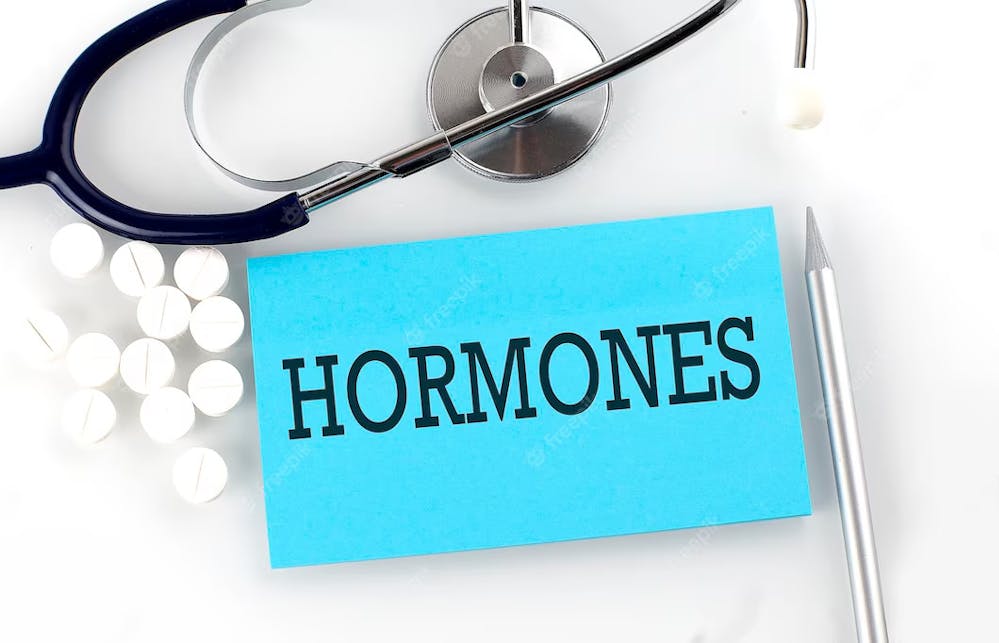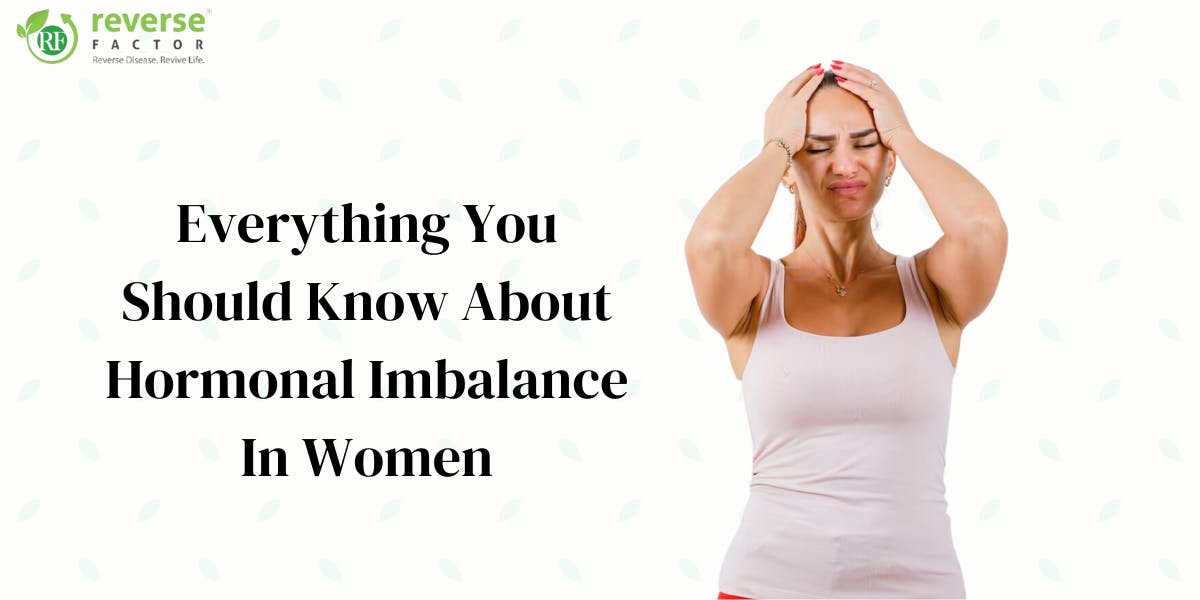Hormonal imbalance in women occurs when there are fluctuations or disturbances in the levels of several hormones in the body. Hormones are chemical messengers that play an important role in controlling biological activities. Hormones like estrogen, progesterone, and testosterone are crucial for the overall health of women.
So, if you are experiencing mood swings, fatigue, or irregular periods, it might be due to shifts in your hormonal balance. Natural life events like puberty, pregnancy, and menopause can contribute to these imbalances. Thus, seeking medical advice from Hormonal Imbalance Treatment In India can promote a healthier life.
However, you must also gain knowledge about its symptoms, causes, and remedies to achieve a more balanced life. Continue reading this blog to gain more knowledge on hormonal changes in women.

What Are Hormones?
Hormones act as messengers in our bodies and deliver crucial instructions to various organs and tissues. They are unique compounds produced by our endocrine glands. Each hormone performs a specific function, such as controlling mood, metabolism, and reproduction. In simple terms, hormones help keep our bodies working smoothly by controlling various functions. When your hormones are in balance, you may feel good and are healthy, but when they are out of balance, it can lead to a variety of health problems.

Do you want to balance your hormones naturally? Read Now : How To Balance Hormones Naturally - Best 18 Ways
What Are The Main Causes Of Hormonal Imbalance In Women?
Following are some common causes of hormonal imbalance that might affect your mood and energy level-
Natural Life Stages
Women's bodies undergo major changes during various stages of life, which might lead to hormone imbalance. Girls go through hormonal surges during puberty as they develop into young ladies. Pregnancy requires a complex interaction of hormones to support fetal growth and development. As women approach menopause, changes in their reproductive hormones cause menstruation to stop. These transitions can upset the delicate hormonal balance. It can lead to a variety of symptoms like irregular periods, mood swings, and hot flashes. As pregnancy is one of the most vital stages in a woman’s life, one should opt for a trusted health care program of pregnancy care in India. It can help you ensure a happy and safe pregnancy journey.
Medical Conditions
Hormonal imbalances can also result from certain medical conditions. It includes thyroid disorders and PCOS, which impact the ovaries and hormones in women.
Stress
Women who experience high levels of stress may have excessive levels of the stress hormone in their bodies. It can affect other hormones and lead to imbalances.
Unhealthy Diet
Eating too much junk food, sugary snacks, and unhealthy fats can also disrupt the hormone production and balance in your body.
Lack of Physical Activity
Women who do not engage in regular physical activity may experience hormonal imbalances in their bodies. Regular exercise helps to keep hormones in balance, but a lack of movement can upset this balance. Physical activity acts as a signal to our body's hormone system, and without it, hormones may malfunction.
Other Factors
Hormone balance in women can be affected when they don't get enough sleep. Likewise sudden weight gain or loss and aging can impact your hormone levels. These are some common reasons for hormonal imbalance that can lead to several health problems. They can impact one's mood, level of energy, and general well-being.
Increase your knowledge on hormonal health : Diabetes and Hormonal Imbalance: Understanding the Link
Symptoms Of Hormonal Imbalance In Women
Hormonal imbalance symptoms in females can vary according to their affected gland. However, some common signs of hormonal imbalance in women are listed below –
- Irregular Periods
- Constipation
- Mood Swings
- Insomnia
- Infertility
- Low Sex Drive
- Abdomen pain during menstruation
- Sudden weight gain or loss
- Rashes on skin
- Excessive hair growth
- Fatigue
- Acne
- Hot flashes
- Digestive issues or bloating
Say Goodbye To Diseases: Foods That Boost the Immune System: Top 18 Foods to Eat!
Effects Of Hormonal Imbalance In Females
Let’s try to learn about the effects of hormonal imbalance that can impact your health and general well-being.
Cravings For Food
If you are experiencing strong cravings for particular meals, it could be a result of hormonal imbalances. These cravings are caused by the impact of hormones on appetite-regulating brain signals.
Irregular Periods
Hormonal changes in menstrual cycle can affect the timing and flow of your periods. Hormonal imbalances, such as elevated estrogen levels or changes in progesterone, can lead to missed periods.
Chronic Acne
It's common to get a few pimples before or during your period, but if acne doesn't go away, it may be caused by hormonal imbalances. This is one of the common signs of hormonal imbalance in females. Excessive amounts of androgens can cause your skin to produce high amounts of oil. It can block pores and triggers acne breakouts.
Dry Skin
Skin dehydration and dryness can also result from hormonal imbalance in women. For instance, menopause can make the skin thinner and affect its capacity to absorb moisture. Thyroid issues may also lead to dry skin.
Mood Swings
Hormonal changes can affect the brain's neurotransmitters. This can result in sudden and intense mood swings. Estrogen and progesterone play important roles in emotional regulation. These imbalances can lead to irritation, anxiety, or depression.
Breast Changes
Hormonal changes during the menstrual cycle or menopause, can result in breast discomfort. A drop in estrogen might result in less dense breast tissue. While an increase in the hormone can cause the tissue to thicken, sometimes leading to new lumps or cysts. Even if you don't have any other alarming symptoms, you should still consult a doctor if you observe any changes in your breasts.
What Is The Best Natural Cure For Hormonal Imbalance?
Making healthy lifestyle modifications is the best natural hormonal imbalance treatment. A healthy diet rich in fresh produce, whole grains, and fiber can help you keep hormone levels in check. Also, prioritize regular physical activity to regulate your hormone level and reduce stress. Activities like yoga or meditation are one of the most effective hormonal imbalance treatment at home. Consuming turmeric, aloe vera, and fenugreek seeds can also help regulate hormonal disbalance in females.
Take Charge Of Your Hormonal Well-Being
You can make better decisions if you are aware of the hormonal changes that occur in your body. Adopt a healthy lifestyle that includes a healthy diet. Practice regular exercise, and stress-reduction strategies like yoga or meditation. Make self-care a big priority, pay attention to your body's signals, and, if necessary, seek professional advice.
Frequently Asked Questions –
What Are Signs Of Hormonal Imbalance In Women?
Women may have irregular periods, mood swings, and fatigue, acne as symptoms of hormonal imbalance.
How Do I Balance My Hormones?
Focus on maintaining an active lifestyle with regular exercise. Consume a healthy diet rich in fruits and vegetables, and reduce stress to maintain hormonal balance.
Which Fruit Is Best For Hormones?
Apples, pomegranates, and citrus fruits are considered the best fruits for hormonal balance.
What Is The Fastest Way To Balance Hormones?
If you want to balance your hormones quickly you must consume more fruits and veggies, and work on stress management.
What Foods Balance Hormones?
Hormone-balancing foods include Flaxseed, cauliflower, nuts and seeds.
What Foods Should Be Avoided In Hormonal Imbalance?
If you have a hormonal imbalance, avoid processed foods, sugary snacks, excessive caffeine, and foods high in saturated fats.




